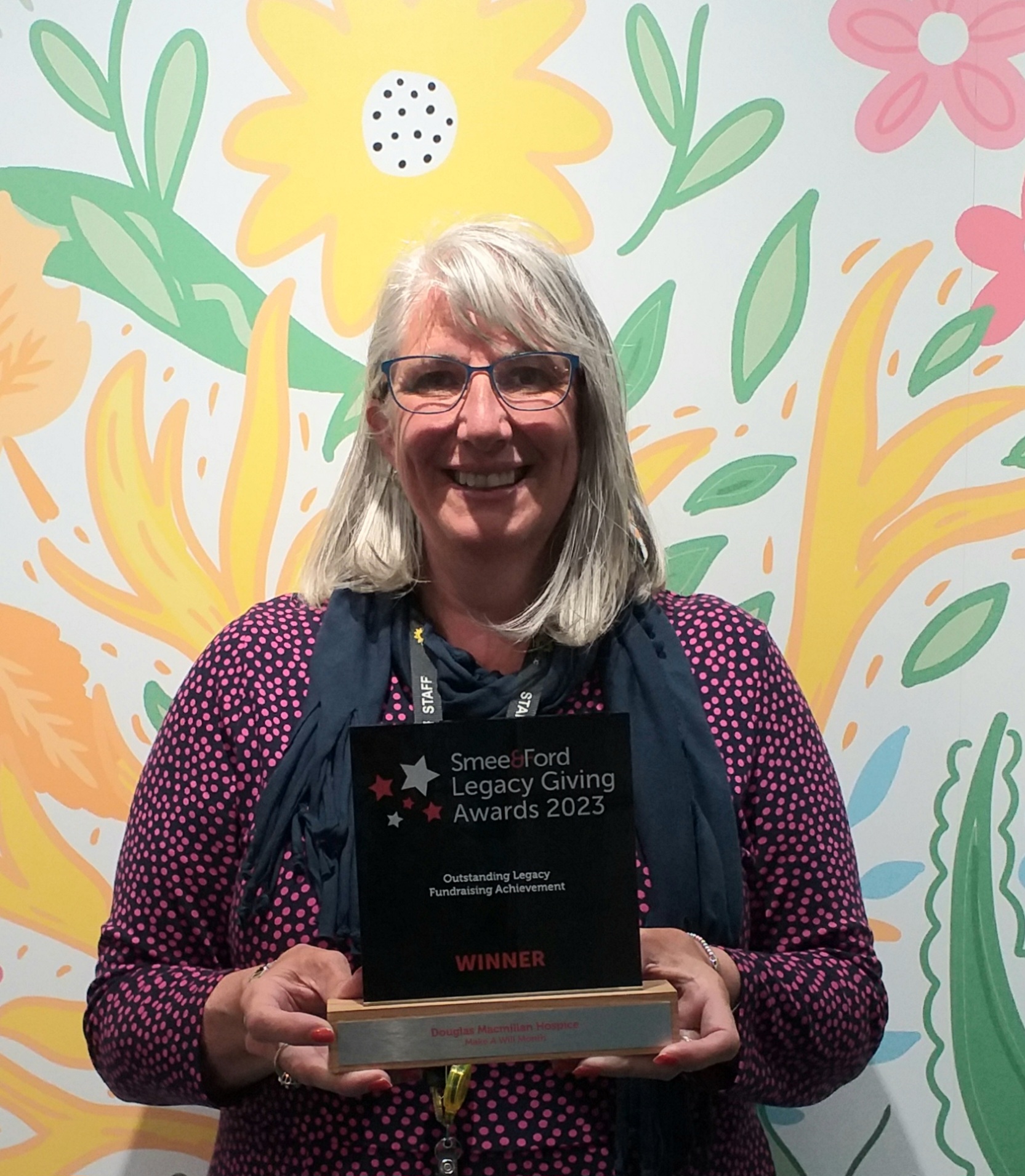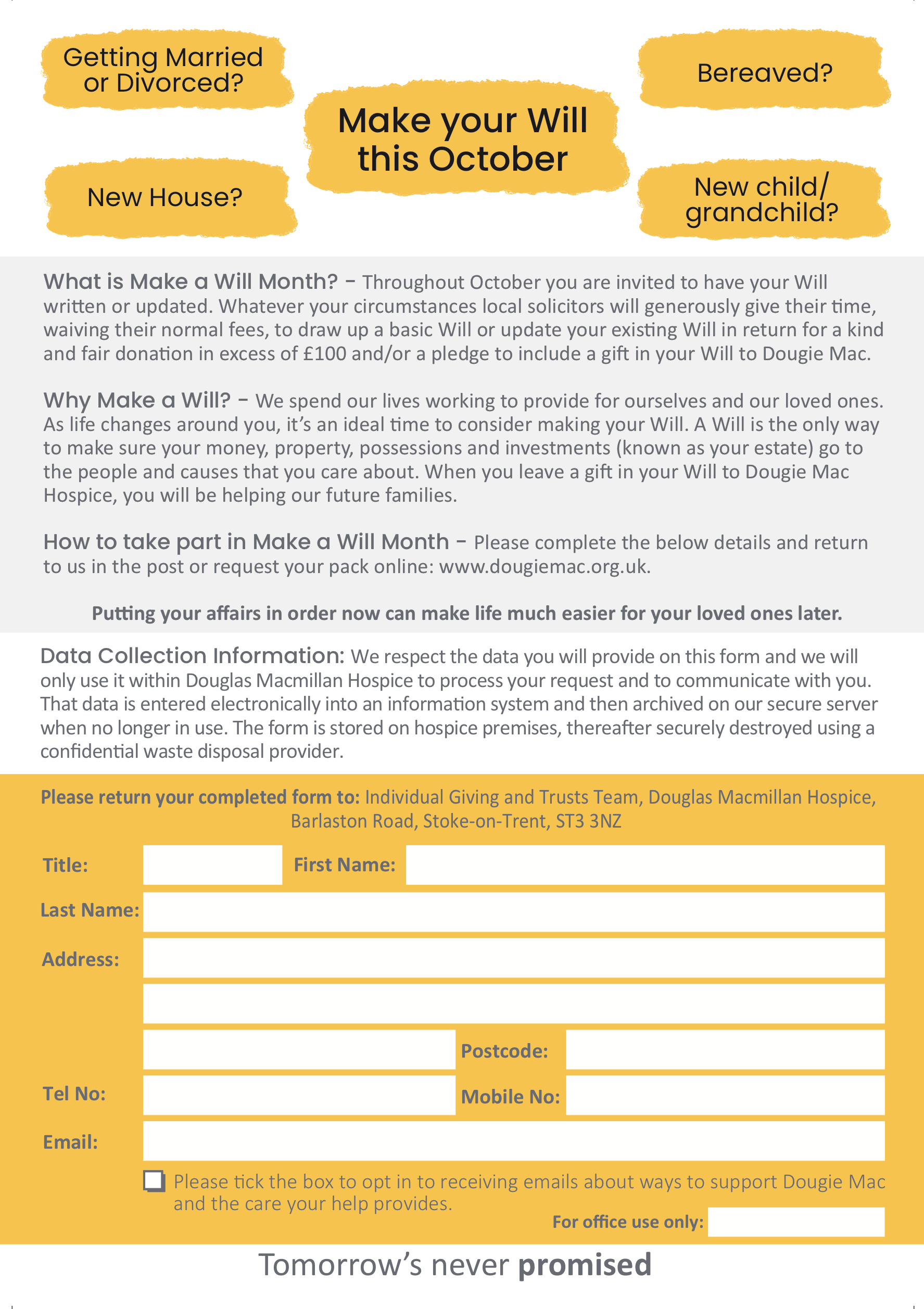
After the legacy giving sector came together at the Smee & Ford Legacy Giving Awards in April, we want to continue the celebration of legacy professionals and the impact of their incredible work.
In this new series, Legacy Limelight, we will be sharing inspirational stories from across the legacy sector, shining a light on the difference that legacies can make for charities and their beneficiaries, and showcasing the people who make legacy gifts happen.
This September, we are proud to be joining forces with hundreds of charities, professional advisers, and partners across the UK to celebrate Remember A Charity Week.
Read the interview below!
Sign up below to stay up to date with the Legacy Limelight series.
Keep an eye out for emails about Legacy Limelight and make sure your voice is heard!


Q: How important are legacies as an income stream for Douglas Macmillan Hospice and the overall fundraising strategy for the charity?
Legacy donations alone are approximately 16% of the entire income, so a really important part of our Income Generation Strategy.
Q: Can you tell us a bit more about your ‘Make a Will Month’ and what has made it a success?
Make a Will Month campaign takes place in both May and October each year. We have approximately 20 local solicitors who partner with us and write a basic Will free of charge. For someone to take part in the scheme they must make a voluntary donation in excess of £100 to Dougie Mac instead of paying a solicitor or they can pledge to gift in excess of £500 to Dougie Mac in their Will. Upon receipt of their enquiry we telephone them to start our relationship, explaining how the scheme works and send them a special voucher to present to the solicitor. It is then the skill of the legacy fundraiser to share with the donor how important legacies are to Dougie Mac and how their support helps our future generations. Dougie Mac does not pay any money out to the solicitors so there is no cost to us. The donor makes the appointment directly with the chosen solicitor. At the end of the campaign we visit the solicitors to follow up any appointments they have completed and write out to thank the donors, knowing whether they are a new legator or a new supporter for the hospice. That is usually the start of a long-term relationship and supporter journey, allowing us to engage them in a stewardship programme.


Example of the Douglas MacMillan Hospice Will month campaign
Q: What was the biggest challenge(s) about this project and how did you overcome it/them?
We changed how we did it and introduced a donation up front or a pledge in their Will. The commitment from the initial enquirer became more reliable, meaning that the majority of enquiries converted to a donation to the hospice, whether a cash donation there & then or a gift in their Will. The challenge was to re-educate the supporters because in the past some people thought they could donate £20 or nothing at all. This irritated the supporting solicitors and therefore we lost some support from them…the new way takes a little more skill of the fundraiser to explain the scheme, but positively enhances the relationship with the supporter.
Q: Roughly 70% of the participants pledged a gift to you, what do you think was the key driving factor(s) behind this result?
The impact the hospice has on local families. Having the fundraiser speaking or engaging with them directly before they visit the solicitor, and also having excellent & solid partnerships with the solicitors to talk it through with the donor at the appointment.
Q: What other impacts has this campaign had for Douglas Macmillan Hospice?
It is a way to drip feed the legacy message…spreading the magic of Dougie Mac across the area…enabling us to engage with more local people and educating them about our services. This in turn will help local people understand more about the hospice, dispelling myths and helping more poorly people to access the services.
Q: What was your top learning from this campaign, and how will you take that forward into subsequent projects?
The follow up phonecall/contact with the enquirer/supporter. Developing a strong relationship is key to the longevity of their support. Definitely something that can be applied to other campaigns.
Q: What do you think the top challenge(s) will be for legacy marketing teams over the next year?
Younger generations will not have the same value to their estates when they die people nowadays spend their money, buy things on credit and therefore do not have the same value of assets. In future years I don’t believe there will be the same value left in estates. We need to remember to drip feed the legacy message as often as we can in whatever way we can.
Q: If you had to give just one top tip for a legacy marketing team to focus on right now, what would it be?
Aim the legacy message at the supporter, not the hospice. Talk about them, about what matters to them, and how other local people will benefit from their generosity, making it all donor centric.
We need to remember to drip feed the legacy message as often as we can in whatever way we can.
We have also spoken to Elle Cohen from Shelter. The team at Shelter won the Excellence in Collaboration and Partnership in Legacy Giving at the Legacy Giving Awards.